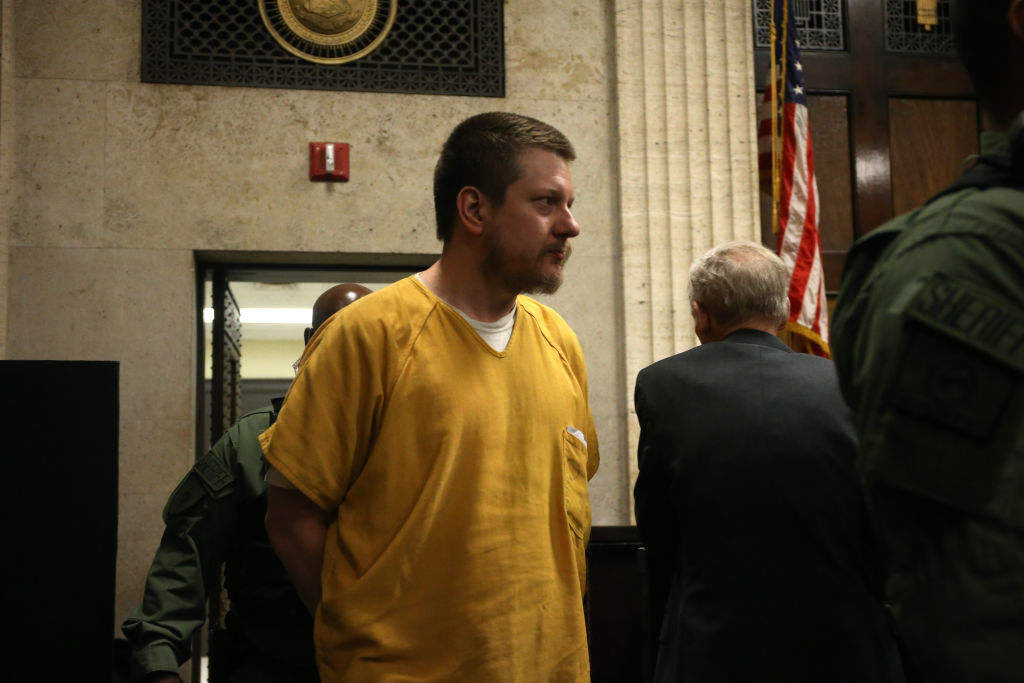Update (March 19, 2019): The Illinois Supreme Court denied the request of a special prosecutor and the Illinois attorney general to resentence former police officer Jason Van Dyke for the killing of Laquan McDonald on Tuesday.
The court's decision was split, with two justices dissenting and four ruling in favor of the original sentence, USA Today reports. One judge abstained from the proceedings.
Last month, Van Dyke was sentenced to six years and nine months for the second-degree murder of McDonald. However, the prosecutor in the case and the Illinois attorney general believed Van Dyke should have been sentenced to at least 18 years and up to 96 years based on the aggravated battery charges he also faced.
Blavitize your inbox! Join our daily newsletter for fresh stories and breaking news.
Illinois law requires citizens be convicted on the most serious charge they face should they face multiple charges. Those opposed to the former officer's sentence felt the aggravated battery charge was more severe given Van Dyke used a firearm and fired 16 shots at McDonald. Sentencing him on this charge would have meant a longer prison sentence.
Only two Supreme Court justices agreed with this interpretation of sentencing laws, CNN reports.
“The trial court's actions here were clearly improper as a matter of law," Justice Thomas Kilbride reportedly wrote in his dissent. "Under these circumstances, I believe this court should enter a supervisory order directing the trial court and resentence Van Dyke in accordance with the applicable sentencing law, including this court’s relevant decisions."
The justices who ruled in favor of Van Dyke's original sentence did not provide a public statement about their decision. As they formed the majority, the ex-officer's six-year and nine-month sentence will stand.
"We hope that the decision will strike a fatal blow to the political exploitation of the death of Laquan McDonald," said Van Dyke’s attorney Dan Herbert following the judgment. "Our judicial system may not be perfect. However the bedrock of the system maintains that all defendants, including unpopular ones, are entitled to fair and impartial treatment."
Illinois Attorney General Kwame Raoul did not share Herbert's assessment, NBC News reports.
"The majority’s denial, without explanation, does not confirm whether Judge Gaughan’s sentence is consistent with Illinois law," Raoul said. "Nonetheless, we recognize and respect the court’s authority, which it can exercise without a specific request."
Van Dyke is currently serving his time at a federal facility in New York. He was moved there after he was assaulted at his former prison in Connecticut. According to Illinois law, Van Dyke must serve at least 50 percent (three years and fourteen months) of his sentence before being considered for parole.
Original: Jason Van Dyke, the man who killed Laquan McDonald, received a sentence of six years and nine months for the second-degree murder. Now, Illinois Attorney General Kwame Raoul and special prosecutor Joseph McMahon say by law, Van Dyke could have and should have received more time for the murder.
The prosecutor and attorney general want to know why the judge didn't sentence Van Dyke to six years for each of the 16 shots he fired at the teen and are lobbying the Illinois Supreme Court to reconsider the former police officer's sentence, USA Today reports.
“It is important that a police officer was held accountable for criminal conduct,” McMahon said in a press release, according to NBC News. “But we argued at the sentencing hearing that Jason Van Dyke should be sentenced for the aggravated battery with a firearm convictions (sic)."
Marvin Hunter, McDonald's great-uncle, believes the sentence is illegal. He reached out to the prosecutors in a letter, claiming the 81-month sentence violates Illinois' “one act, one crime” law. This law states a person convicted of multiple charges can only be sentenced to one charge and mandates the court work to convict that person on the most serious of the charges.
“Illinois law required Judge Gaughan to impose sentence on the aggravated battery convictions, not the second-degree murder conviction,” Hunter wrote.
The judge chose to ignore the aggravated battery charges and to sentence based only on the second-degree murder charge, as Blavity reported. In general, murder is considered more severe than an aggravated battery charge, but Illinois treats aggravated battery with a firearm as more serious than second-degree murder. As Van Dyke committed his crime with a gun, Hunter believes the case's judge misruled.
Raoul and McMahon seem to agree with Hunter.
“After conducting a thorough review of the record in this case and the law, and in consultation with the special prosecutor, I determined that a mandamus action must be pursued in the Illinois Supreme Court,” Raoul said at a press conference.
By law, Van Dyke is required to serve the minimum of half of his sentence; his team has recently asked that he be released on probation. Should he only serve the minimum time, Van Dyke could be out in a little over three years if his current sentence is not reviewed and overturned by his state's Supreme Court.
Blavitize your inbox! Join our daily newsletter for fresh stories and breaking news.
Now, check these out:
Ex-Cop Who Fatally Shot Laquan McDonald Sentenced To Nearly 7 Years In Prison
Chicago Cop Jason Van Dyke Found Guilty Of Murder In Death Of 17-Year-Old Laquan McDonald
Jason Van Dyke Claims He Shot Laquan McDonald 16 Times Trying To Hit His Knife
